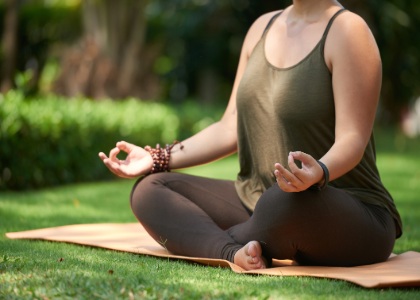
Meditation
By Team Reboot
When deciding to take control of your health, your first thought is of course about what you will (and won’t) eat. Diet and exercise are certainly important – but your thoughts and emotions also have a powerful influence on your physical health; your mind has a big role to play in this journey.
You may have heard that meditation is a great way to reduce stress and a very effective tool for mental peace – but did you know it is also great for your body? It can help boost your immune system, lower cholesterol, ease chronic pain, improve circulation and reduce insomnia.
As we move through our day we tend to have many things on our mind. The goal of meditation is simple: by bringing our attention to just one thing (such as our breathing), we focus our mind and deepen our awareness of the present moment rather than dwell on a past that we can’t change, or worrying about a future we can’t yet know.
How to Meditate
Meditation is like exercising a muscle – each time you try it your practice will get stronger. Don’t worry if you feel frustrated at first. As beginners we might think “am I doing it right?” or “why can’t I just quiet my mind?” When this happens, re-focus on your breath and practice letting the frustration go. You will get better at it in time.
Here a few tips on beginning a meditative practice:
1) Pick a specific place in your home to meditate, ideally a different spot from where you do work, exercise, or sleep. Create a pleasant environment that feels peaceful and serene to you; for example some people like to place candles or other spiritual objects in the room.
2) Get grounded and comfortable. Warming up your body by stretching to loosen the muscles and tendons before you start can allow you to sit more comfortably. Don’t worry that you have to sit cross-legged on the floor to meditate properly! The best position is whichever helps you stay focused; you can sit on a chair or sofa, lie on the floor, or even stand up and walk around.
3) Start with and always return to your breath. Breathing deeply slows your heart, relaxes your muscles, focuses your mind, and re-connects you to your world.
4) Make mediation a scheduled practice. Attach it to your daily routine by always meditating before you shower in the morning for example, or before you get into bed at night.
5) It doesn’t have to be long, start with five minutes and gradually work up to 15 or 20.
To help you experience the benefits of meditation during the 3-day Reboot we will share 3 recordings from Dr. Russell Kennedy, each guiding you through a five minute meditation. When you have a few quiet moments to yourself and are ready to mediate you can download the file or listen to it here.
Day 1
Day 2
Day 3